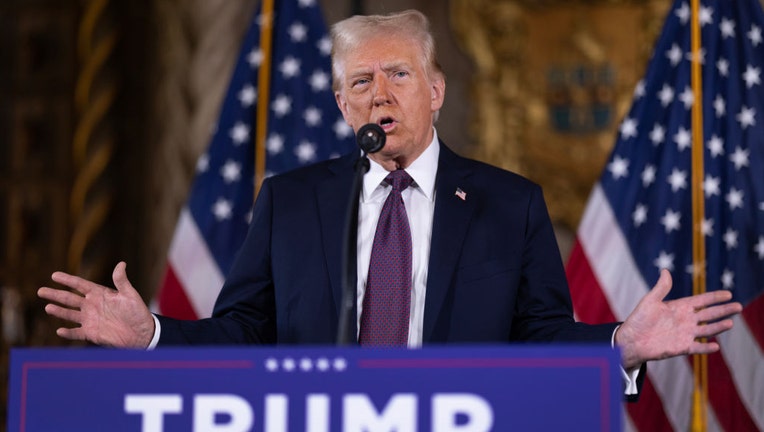Trump proposes 'External Revenue Service' to collect tariffs

FILE-President-elect Donald Trump speaks to members of the media during a press conference at the Mar-a-Lago Club on January 07, 2025 in Palm Beach, Florida. (Photo by Scott Olson/Getty Images)
President-elect Donald Trump wants to create a new federal agency to collect tariffs and other revenues from foreign nations.
Trump announced on his Truth Social platform on Tuesday that he will create the "External Revenue Service" but didn’t offer details about it.
He compared his planned agency to the Internal Revenue Service, which is the nation's domestic tax collector.
What is the ‘External Revenue Service’?
Donald Trump’ proposed agency would "collect our Tariffs, Duties, and all Revenue that come from Foreign sources," according to his Truth Social post Tuesday.
"We will begin charging those that make money off of us with Trade, and they will start paying," he said.
Trump added that next Monday, "January 20, 2025, will be the birth date of the External Revenue Service." He will be sworn in on Jan. 20 as president for a second term in the White House.
Can Trump create an ‘External Revenue Service’?
The U.S. Customs and Border Protection is responsible for collecting tariffs. Congress, not the president, has the power to establish federal government offices. Congress also has broad authority to create government offices to carry out various statutory functions and directives, according to the Constitution.
RELATED: Trump's proposed tariffs: what consumer products could be impacted?
Where does Trump stand on tariffs?
The backstory:
President-elect Donald Trump has floated an across-the-board tariff of 10% or 20% on all goods imported into the U.S., and a larger tariff of 60% on goods imported from China.
Trump also said he would impose a 25% tariff on goods from Canada and Mexico. During a news conference in December 2024, Trump and one of his nominees to a key Cabinet post signaled they want to use tariffs to secure reciprocal trade terms with other countries, FOX Business reported.
RELATED: Trump's proposed tariffs could drive up food prices, experts say
What they're saying:
Trade experts think there could be a significant price impact for consumers based on some of Donald Trump’s policy proposals during the presidential campaign.
"Tariffs drive up the cost of goods domestically by increasing production costs and reducing competition. Ultimately, the higher costs get passed along to consumers, with low-income households again bearing the brunt of the burden," David Ortega, a food economist and professor at Michigan State University told FOX Business in November 2024.
In December 2024, Dr. Madhav Durbha, group VP of CPG and manufacturing at RELEX, told FOX Business, "Items like avocados, mangoes, and other fresh produce heavily sourced from Mexico are highly vulnerable to tariffs. Geographic and environmental constraints make it difficult to shift production, and these tariffs would translate directly into higher prices for consumers at grocery stores."

